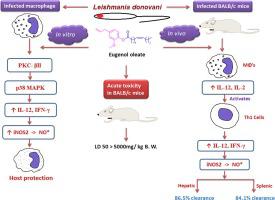Our official English website, www.x-mol.net, welcomes your
feedback! (Note: you will need to create a separate account there.)
Oral administration of eugenol oleate cures experimental visceral leishmaniasis through cytokines abundance
Cytokine ( IF 3.7 ) Pub Date : 2020-10-01 , DOI: 10.1016/j.cyto.2020.155301 Mamilla R Charan Raja 1 , Amrita Kar 1 , Sujatha Srinivasan 1 , Davidraj Chellappan 2 , Joy Debnath 3 , Santanu Kar Mahapatra 1
Cytokine ( IF 3.7 ) Pub Date : 2020-10-01 , DOI: 10.1016/j.cyto.2020.155301 Mamilla R Charan Raja 1 , Amrita Kar 1 , Sujatha Srinivasan 1 , Davidraj Chellappan 2 , Joy Debnath 3 , Santanu Kar Mahapatra 1
Affiliation

|
Visceral leishmaniasis (VL) is an endemic fatal infectious disease in tropical and subtropical nations. The limited treatment options, long treatment regimens, invasive mode of administration of drugs, and lack of effective vaccination are the main reasons for the search of new alternative therapeutics against VL. On this quest, from a series of eugenol derivatives, we had demonstrated eugenol oleate as a lead immunomodulatory anti-VL molecule earlier. In this report, the oral efficacy and mechanism of eugenol oleate in inducing immunomodulatory anti-VL activity has been studied in BALB/c mice model. The plasma pharmacokinetic and acute toxicity studies suggested that the eugenol oleate is safe with an appreciable pharmacokinetic profile. Eugenol oleate (30 mg/kg B.W.) showed 86.5% of hepatic and 84.1% of splenic parasite clearance. The increased Th1 cytokine profile and decreased Th2 cytokine profile observed from ELISA and qRTPCR suggested that the eugenol oleate induced the parasite clearance through the activation of the host immune system. Subsequently, the mechanistic insights behind the anti-leishmanial activity of eugenol oleate were studied in peritoneal macrophages in vitro by inhibitor response study and immunoblotting. The results inferred that eugenol oleate activated the PKC-βII-p38 MAPK and produced IL-12 and IFN-γ which intern activated the iNOS2 to produce NO free radicals that cleared the intracellular parasite.
中文翻译:

口服丁香酚油酸酯通过细胞因子丰度治愈实验性内脏利什曼病
内脏利什曼病 (VL) 是热带和亚热带国家的地方性致命传染病。有限的治疗选择、较长的治疗方案、侵入性的给药方式以及缺乏有效的疫苗接种是寻找针对 VL 的新替代疗法的主要原因。在这个探索中,从一系列丁香酚衍生物中,我们较早地证明了丁香酚油酸酯是一种领先的免疫调节抗 VL 分子。在本报告中,已在 BALB/c 小鼠模型中研究了丁香酚油酸酯在诱导免疫调节抗 VL 活性中的口服功效和机制。血浆药代动力学和急性毒性研究表明,丁香酚油酸酯是安全的,具有明显的药代动力学特征。丁香酚油酸酯 (30 mg/kg BW) 显示 86.5% 的肝脏和 84.1% 的脾寄生虫清除率。从 ELISA 和 qRTPCR 观察到的 Th1 细胞因子谱增加和 Th2 细胞因子谱降低表明丁香酚油酸酯通过激活宿主免疫系统诱导寄生虫清除。随后,通过抑制剂反应研究和免疫印迹,在体外腹腔巨噬细胞中研究了丁香酚油酸酯抗利什曼原虫活性背后的机制见解。结果推断,丁香酚油酸酯激活 PKC-βII-p38 MAPK 并产生 IL-12 和 IFN-γ,后者激活 iNOS2 产生清除细胞内寄生虫的 NO 自由基。通过抑制剂反应研究和免疫印迹,在体外腹腔巨噬细胞中研究了丁香酚油酸酯抗利什曼原虫活性背后的机制见解。结果推断,丁香酚油酸酯激活 PKC-βII-p38 MAPK 并产生 IL-12 和 IFN-γ,后者激活 iNOS2 产生清除细胞内寄生虫的 NO 自由基。通过抑制剂反应研究和免疫印迹,在体外腹腔巨噬细胞中研究了丁香酚油酸酯抗利什曼原虫活性背后的机制见解。结果推断,丁香酚油酸酯激活 PKC-βII-p38 MAPK 并产生 IL-12 和 IFN-γ,后者激活 iNOS2 产生清除细胞内寄生虫的 NO 自由基。
更新日期:2020-10-01
中文翻译:

口服丁香酚油酸酯通过细胞因子丰度治愈实验性内脏利什曼病
内脏利什曼病 (VL) 是热带和亚热带国家的地方性致命传染病。有限的治疗选择、较长的治疗方案、侵入性的给药方式以及缺乏有效的疫苗接种是寻找针对 VL 的新替代疗法的主要原因。在这个探索中,从一系列丁香酚衍生物中,我们较早地证明了丁香酚油酸酯是一种领先的免疫调节抗 VL 分子。在本报告中,已在 BALB/c 小鼠模型中研究了丁香酚油酸酯在诱导免疫调节抗 VL 活性中的口服功效和机制。血浆药代动力学和急性毒性研究表明,丁香酚油酸酯是安全的,具有明显的药代动力学特征。丁香酚油酸酯 (30 mg/kg BW) 显示 86.5% 的肝脏和 84.1% 的脾寄生虫清除率。从 ELISA 和 qRTPCR 观察到的 Th1 细胞因子谱增加和 Th2 细胞因子谱降低表明丁香酚油酸酯通过激活宿主免疫系统诱导寄生虫清除。随后,通过抑制剂反应研究和免疫印迹,在体外腹腔巨噬细胞中研究了丁香酚油酸酯抗利什曼原虫活性背后的机制见解。结果推断,丁香酚油酸酯激活 PKC-βII-p38 MAPK 并产生 IL-12 和 IFN-γ,后者激活 iNOS2 产生清除细胞内寄生虫的 NO 自由基。通过抑制剂反应研究和免疫印迹,在体外腹腔巨噬细胞中研究了丁香酚油酸酯抗利什曼原虫活性背后的机制见解。结果推断,丁香酚油酸酯激活 PKC-βII-p38 MAPK 并产生 IL-12 和 IFN-γ,后者激活 iNOS2 产生清除细胞内寄生虫的 NO 自由基。通过抑制剂反应研究和免疫印迹,在体外腹腔巨噬细胞中研究了丁香酚油酸酯抗利什曼原虫活性背后的机制见解。结果推断,丁香酚油酸酯激活 PKC-βII-p38 MAPK 并产生 IL-12 和 IFN-γ,后者激活 iNOS2 产生清除细胞内寄生虫的 NO 自由基。









































 京公网安备 11010802027423号
京公网安备 11010802027423号